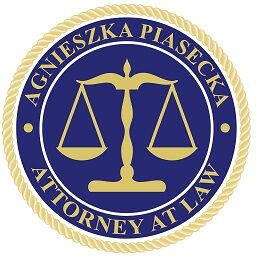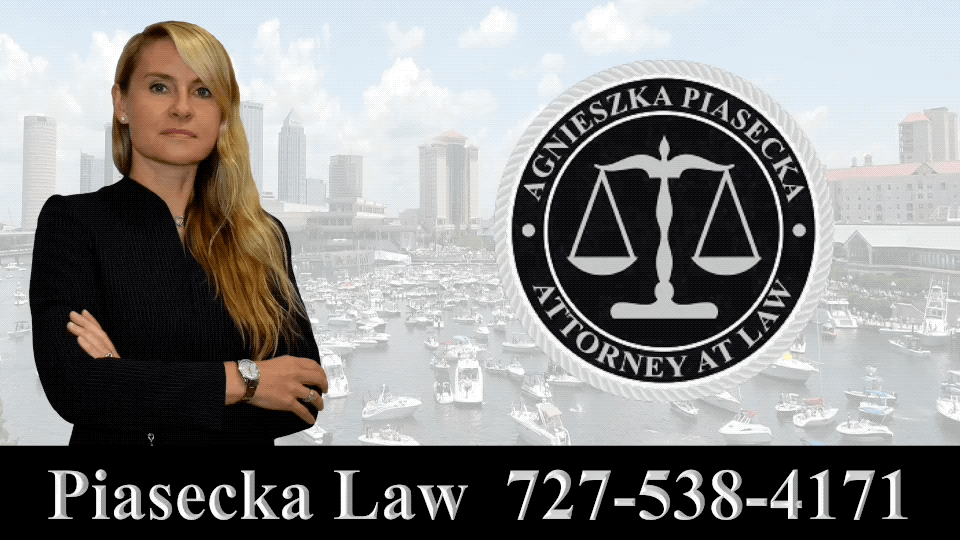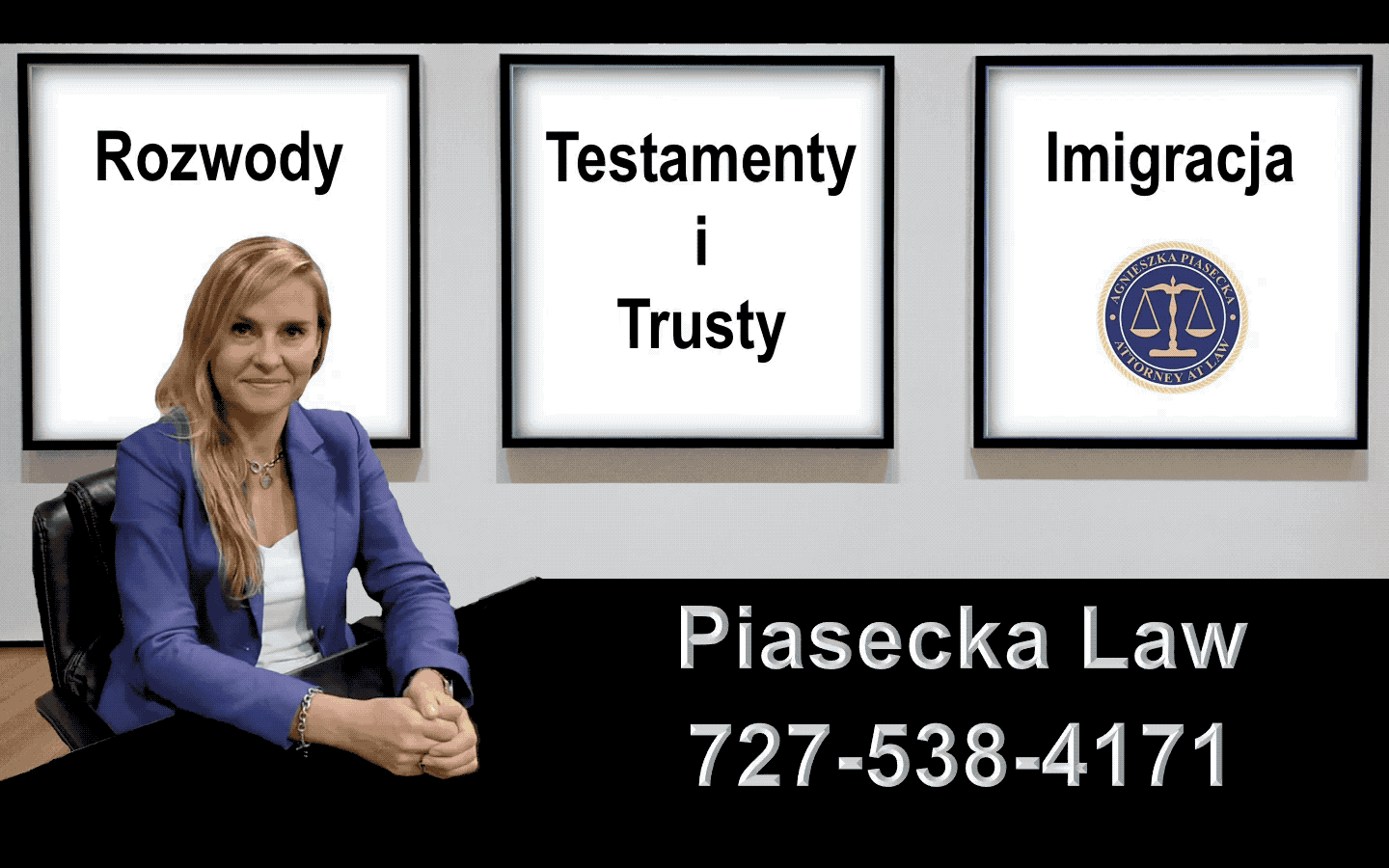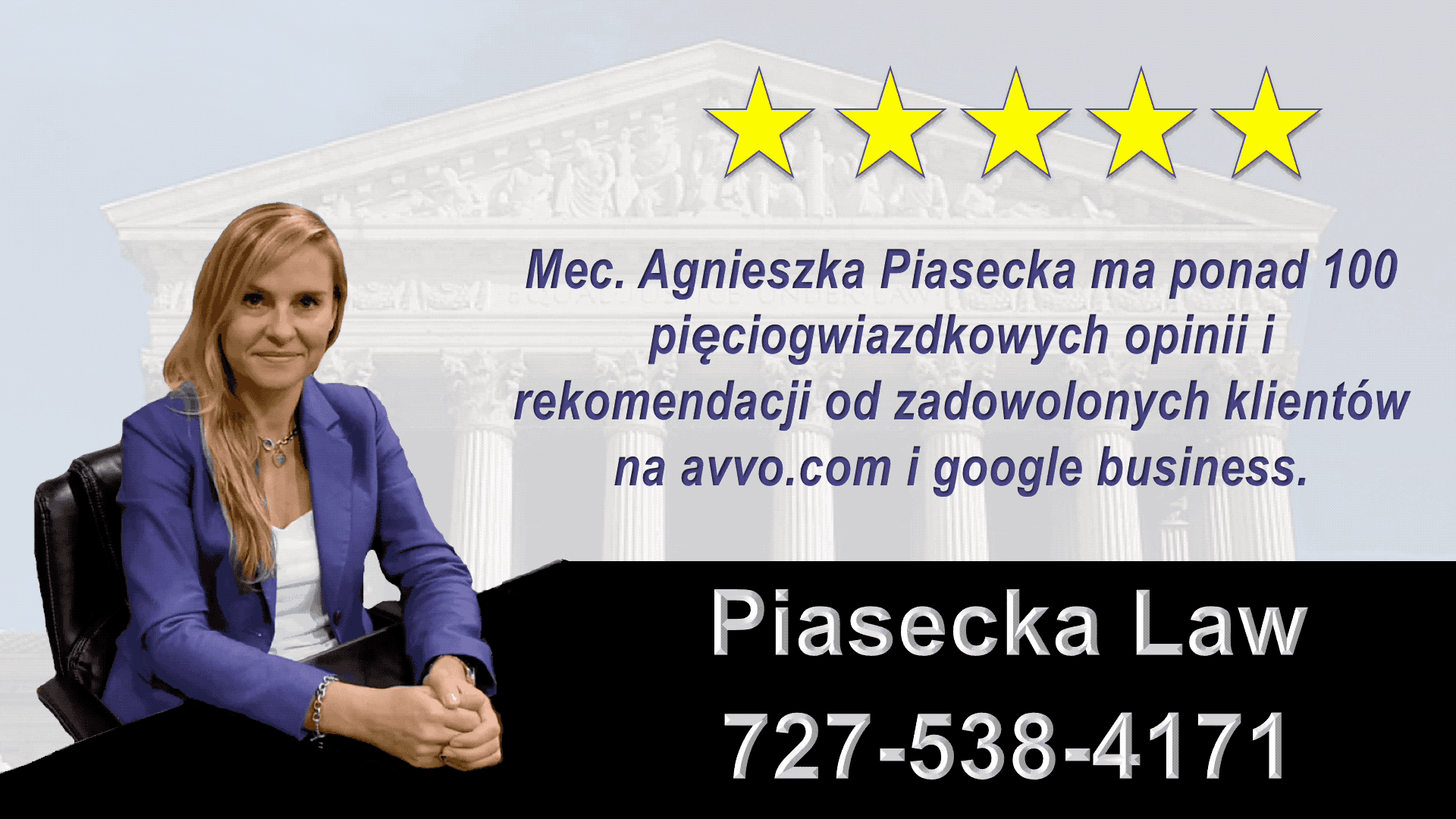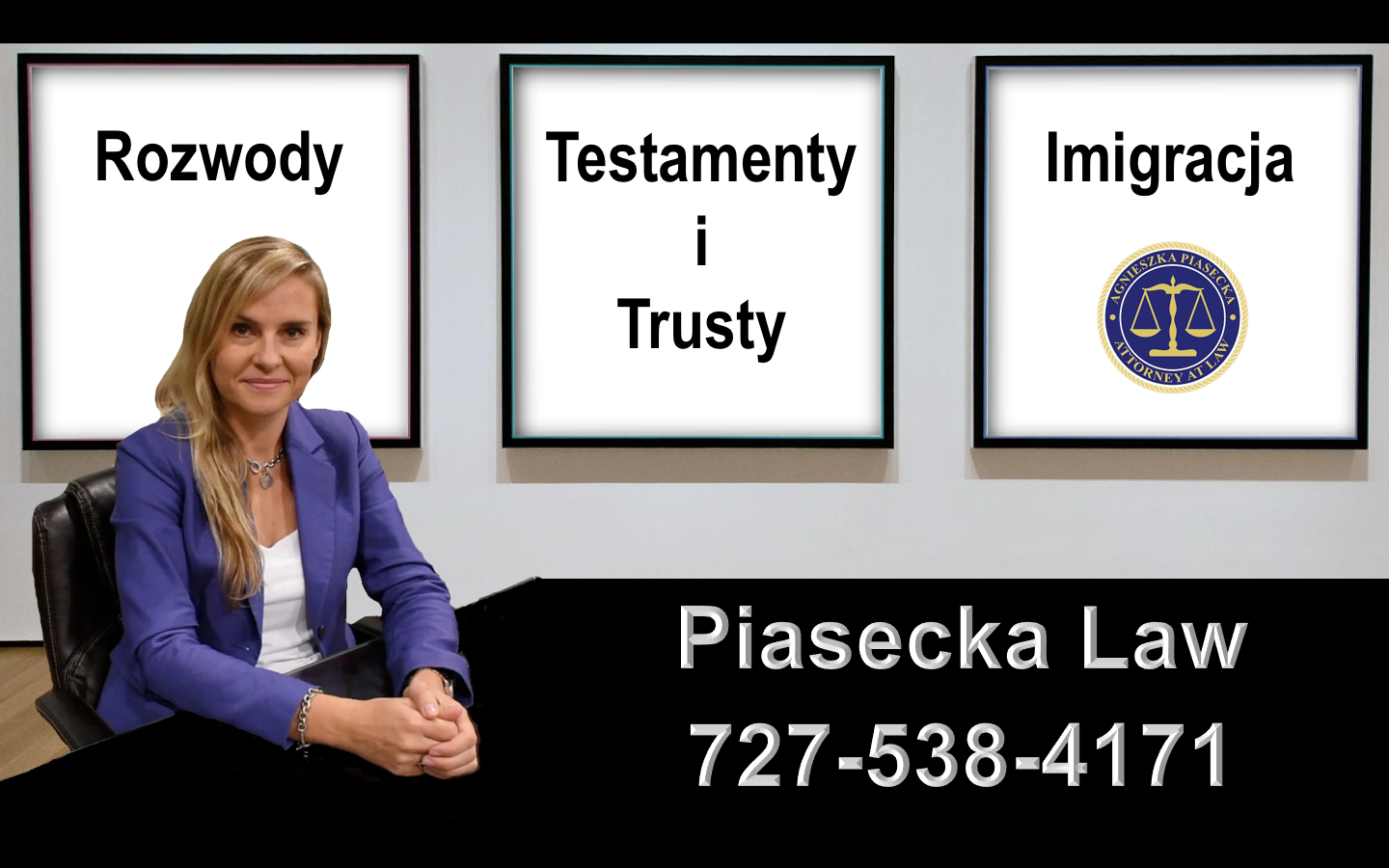Attorney Agnieszka “Aga” Piasecka, Esq. / Polski Adwokat Tampa
For a free consultation please call / W sprawie darmowej kosultacji zadzwoń na:
727-538-4171
813-786-3911
For Wills, Trusts and Power of Attorney, Aga offers FLAT RATES AND “PACKAGE DEALS.
Attorney Aga Piasecka has experience with Estate Planning and Probate Law and can help you with:
- REPRESENTATION IN PROBATE PROCEEDINGS
Probate is a court-supervised legal process, through which decedent’s assets are identified and disbursed to beneficiaries named in a will or heirs in accordance with Florida law in case if there is no will A will typically appoints a Personal Representative to administer the estate of the deceased person. If the decedent did not leave a will and there are assets to be probated, the estate of the decedent must be distributed pursuant to the Florida probate law.
In general, the estate’s assets are identified and they are first used to pay the costs of probate proceedings, then to pay the decedent’s debts, and the remainder is distributed to the decedent’s beneficiaries. Florida law provides the order of priority regarding payment of costs and debts as well as distribution of the assets.
There are generally two types of court supervised probate proceedings in Florida and a third, non-court supervised administration:
1. A “Formal Administration” applies when there are assets exceeding $ 75,000 and/or when it is necessary to appoint a Personal Representative to administer the estate.
2. A “Summary Administration” applies to situations when the total value of the probate estate does not exceed $ 75,000 and the appointment of a Personal Representative is not necessary.
3. The non-court supervised administration process is called “Disposition of Personal Property Without Administration”. This type of probate administration is filed only in limited circumstances and may be filed via informal petition to request release of the decedent’s assets to reimburse the person who paid the final expenses such as e.g. funeral costs, medical bills etc.
Probate process can be lengthy and very expensive. The duration of probate proceedings depends on many factors and it may last from a few months up to even a few years. During that time, the decedent’s assets remain “locked” in the court proceedings and unavailable to heirs and/or beneficiaries. The typical costs of probate proceedings may be as high as several percent of the estate’s value. A big part of the probate costs are attorney’s fees and due to high complexity of even simple probate administrations, it is almost always necessary to engage an experienced attorney. Moreover, probate proceedings are a matter of public record, therefore there is no privacy assured when your estate goes through probate. Thus, it is very important to plan ahead in order to avoid probate whenever possible.
- WILLS
A “last will”, also called “testament” is a written legal instrument, in which a person disposes of his or her property after death. Under Florida law, in order to be valid, a will must fulfill certain legal requirements. Wills must be validate by probate court in probate proceedings. After one’s death, a will must be admitted to probate court and go through probate proceedings. The custodian of the deceased’s original will, must file the will with the Clerk of the Court in the county where the decedent was domiciled, within 10 days after learning the person is deceased.
A will typically appoints a person to administer the deceased’s estate, so-called personal representative. If no personal representative has been named, it may be necessary for an attorney to file a petition with a court on behalf of the heirs, beneficiaries and other interested parties to a appoint a personal representative. Florida rules of law govern, who can become a personal representative and how will she or he be compensated.
- LIVING WILLS
A “living will” is a written legal instrument stating a person’s desires regarding his or her medical treatment and/or end-of-life medical care in case of serious illness when they are no longer able to express informed consent and communicate their decisions to physicians and medical personnel. It is also called a “health care directive” or “advance directive”. A “living will” is different than a regular will, in which a person expresses their desires regarding distribution of their assets after death. Unlike a will, a “living will” has no power after one’s death. A “living will” is a very important document, which can give doctors and family members invaluable guidance with making critical decisions as to a choice of medical treatment when a person becomes seriously ill and can no longer give informed consent and communicate their preferences.
- HEALTH CARE DIRECTIVES
A “health care directive” also called “advance directive” to physicians is another name for a “living will”, in which a person states his or her desires regarding medical treatment preferences in case of serious illness, when they are no longer able to give informed consent and communicate their wishes.
- ADVANCED DIRECTIVES
An “advance directive” is another term for a “living will” or “advance directive”, which is a written legal instrument, in which a person states his or her desires and preferences regarding medical treatment in case of serious illness, when they are no longer able to give informed consent and communicate their decisions.
- TRUSTS
A “trust” is a legal arrangement regarding property, in which the creator of the trust (called Settlor) transfers ownership of assets into care of another person (called Trustee), who holds legal title to property of the settlor with equitable duties to administer it for the benefit of a third person (called Beneficiary). A settlor can be the same person as trustee and there can be more than one beneficiary of the trust. In order to form a valid trust, one must meet certain legal requirements. The document that establishes the responsibilities of the trustee and the rights of the beneficiaries is called the “trust”, “trust instrument” or “trust agreement”.
The main advantage of creating a trust (as opposed to a will) is to avoid probate proceedings and spare your beneficiaries the expense and delay of probate court proceedings after your death. Certain trusts can be also used for asset protection against creditors.
There are many different types of trusts including:
1. Living trusts
A living trust, also called inter vivos trust is created during the settlor’s lifetime . Living trusts can be either revocable or irrevocable.
a. Revocable trusts
The settlor remains in control and ownership of his or her assets and can be changed and terminated at any time. This type of trust does not provide protection against creditors but it is an excellent tool to dispose of your property after death by avoiding probate proceedings. Once assets are transferred into the trust, they belong to the trust itself, and remain subject to the rules and instructions set up in the trust instrument. The trustee has a fiduciary duty to administer the trust funds accordingly for the benefit of trust beneficiaries. At settlors death, the trust assets pass directly to the beneficiaries and avoid probate proceedings.
b. Irrevocable trusts
Once the irrevocable trust is created, the settlor can no longer control trust assets, modify, change or revoke the trust instrument. Once a property is transferred to the irrevocable trust, no one, including the settlor, can remove the property out of the trust. Generally, this type of trust provides protection against creditors and assures that upon your death, your assets are passed to trust beneficiaries and not to your creditors. However, a court can sometimes invalidate an irrevocable trust if it finds that the trust was established with the intention of defrauding creditors. Therefore, it is important to plan for asset protection well before you even anticipate to be subject to any creditor claims.
2. Testamentary trusts
A testamentary trust, also called a “will trust” or a “trust under will” is set up in a will . A testamentary trust is established only after the settlor’s death, in which it differs from a living trust, which is created during the settlor’s lifetime.
3. Charitable trusts
A charitable trust is established with the intent to benefit a specific charity or general public rather than a private individual or entity. Charitable trusts are eligible for a favorable tax treatment and they are often established as part of an estate plan to lower or avoid imposition of estate and gift tax.
4. Spendthrift trusts
A spendthrift trust is created for the benefit of a person, who is often unable to manage money and control his or her spending and it gives a trustee an authority to make decisions as to how the trusts funds may be distributed and spent for the benefit of the beneficiary. Such a trust limits the beneficiary’s access to the trust funds and also provides protection against beneficiary’s creditors. The beneficiary is prohibited or restricted in assigning present or future income and/or principal in the trust to his or her creditors.
5. Discretionary trusts
A discretionary trust is a trust, in which a settlor has delegated nearly complete or limited discretion to the trustee to decide as to how the trust income and/or principal is distributed to beneficiaries.
6. Support trusts
A support trust is a discretionary trust, in which a trustee has discretion to pay the beneficiary as much income or principal as the trustee believes is needed for support or the beneficiary. The type of support can be determined by terms of trust e.g. “for comfortable support” or for “support in accordance with the beneficiary’s standard of living”. Such a trust provides the beneficiary with partial protection from creditors. The beneficiary’s interest cannot be voluntarily transferred or assigned and is unavailable to general creditors but creditors, who provide necessaries to the beneficiary can usually reach it.
7. Totten trusts
A totten trust, also called “POD (Payable Upon Death) Account” is a revocable trust created during the lifetime of the settlor by depositing his or her money into an account or financial institution, typically in a savings account, in the depositor’s name as trustee for another. An individual or an entity can be named as beneficiary. Upon the settlor’s death, the money passes directly to the beneficiary and avoids probate. A totten trust can be revoked at any time as the gift is not completed until the settlor’s death. A totten trust is commonly used to indicate a successor to the bank account without having to create a will.
8. Self-settled trusts
A self-settled trust is a type of trust, in which the settlor is also the beneficiary, i.e. the one, who receives benefits from the trust.
- POWER OF ATTORNEY
Aga offers flat rates on preparation of powers of attorney. A power of attorney is a written legal instrument that gives someone authority to act on another person’s (principal) behalf and represent him or her in private affairs business, medical, or some other legal matters.
- MEDICAL POWER OF ATTORNEY
Aga Piasecka, Esq. offers flat fees on preparation of medical powers of attorney. A medical power of attorney is a written legal instrument that allows you (principal) to appoint a person that will have authority to make medical decisions on your behalf in case you become unable to make them for yourself.
For a free consultation please call Attorney Aga Piasecka at her office: 727-538-4171 or cell: 813-786-3911
For a free consultation please call / W sprawie darmowej kosultacji zadzwoń na: 727 -538-4171 (office) or 813-786-3911 (cell)
For Aga’s immigration story please visit / Historia emigracyjna Agnieszki dostępna jest na: dancingwithunclesam.com
Aga Piasecka, Esq. is an active member of Tampa Bay’s Polish community and has other websites designed to help inform and unite Tampa Bay’s Polish community members and local Tampa Bay Polish Business owners. Please visit her other website and find out what our Polish community has to offer in the beautiful Tampa Bay, Florida area.
The Tampa Bay area links are listed first for your convenience, but there are other links listed bellow for Polish Businesses in the surrounding ares of Tampa, Florida.
Agnieszka Piasecka’s Client Reviews:
https://piaseckalaw.com/reviews
https://www.avvo.com/attorneys/33760-fl-agnieszka-piasecka-4581259/reviews.html
For Agnieszka Piasecka’s immigration story please visit:
You can also visit Aga Piasecka at:
immigrationattorneyclearwater.com
immigrationlawyerclearwater.com
divorceattorneyclearwaterflorida.com
divorcelawyerclearwaterflorida.com
divorceimmigrationclearwater.com
divorceimmigrationstpetersburg.com
polishattorneynewportrichey.com
polishattorneysaintpetersburg.com
polishlawyersaintpetersburg.com
Testamenty i Trusty Tampa – Polski Prawnik / Polski Adwokat w Tampa Bay – Agnieszka Piasecka, Esq. 727-538-4171
Attorney Agnieszka “Aga” Piasecka, Esq. / Polski Adwokat Tampa
Attorney Agnieszka “Aga” Piasecka, Esq. / Polski Adwokat Tampa
Attorney Agnieszka “Aga” Piasecka, Esq. / Polski Adwokat Tampa
Attorney Agnieszka “Aga” Piasecka, Esq. / Polski Adwokat Tampa
Attorney Agnieszka “Aga” Piasecka, Esq. / Polski Adwokat Tampa
Attorney Agnieszka “Aga” Piasecka, Esq. / Polski Adwokat Tampa
